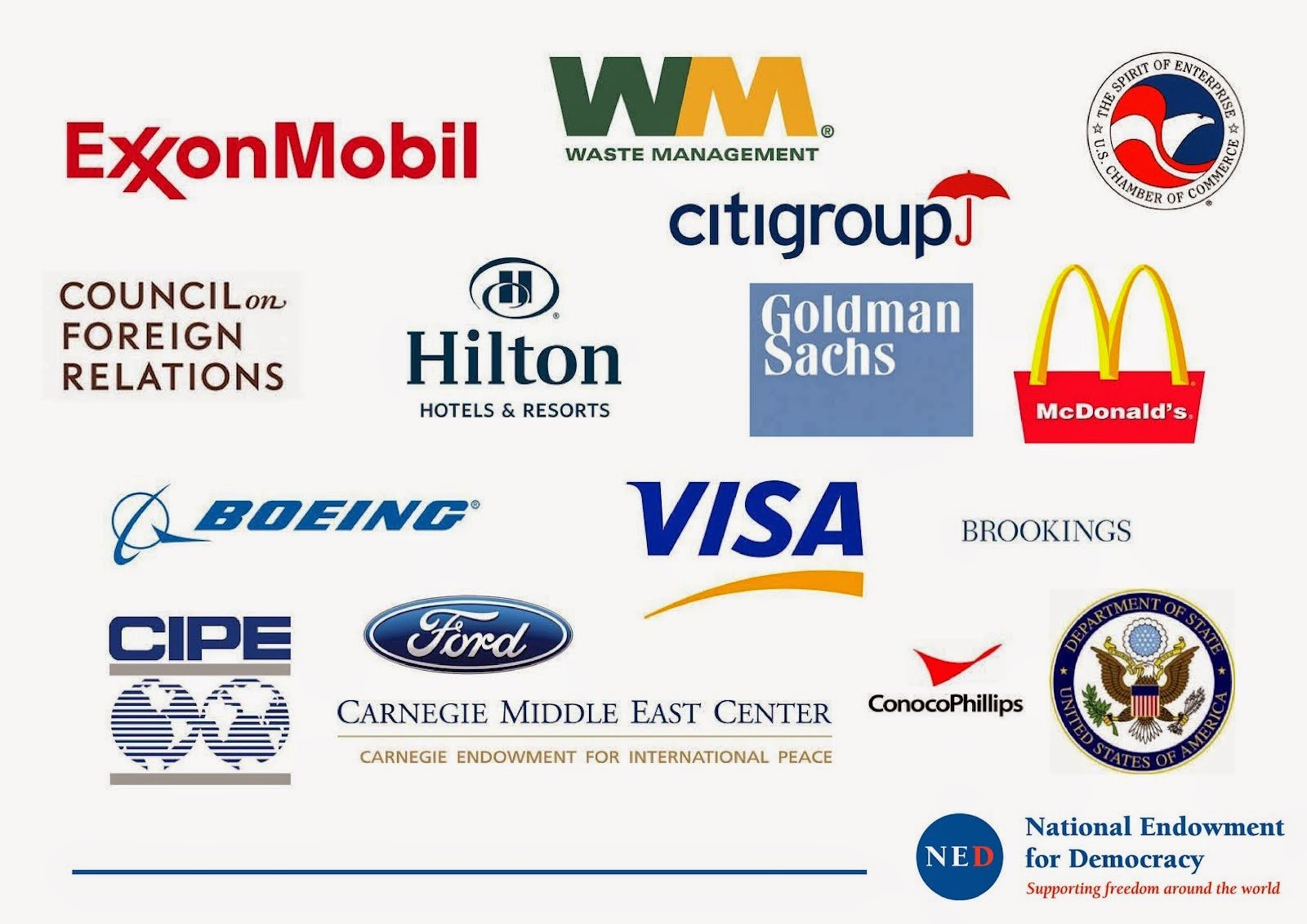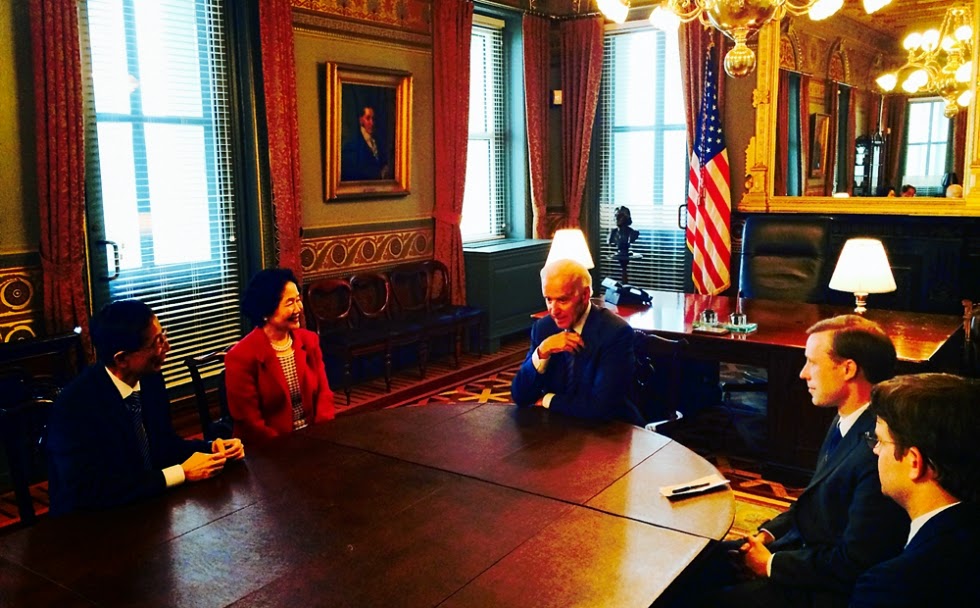Hong Kong’s “Occupy Central” Fooling No One
China’s People’s Daily in an article titled, “Why is the US so keen on ‘Color Revolutions’?,” states what has become abundantly obvious over the past several weeks of protesting in Hong Kong – that the protests are driven by foreign interests masquerading as a “desire for democracy.” The article states specifically that:
According to media reports, Louisa Greve, a director of the National Endowment for Democracy of the US (NED), was already meeting with the key people from “Occupy Central” several months ago, to talk about the movement. Louisa Greve is the vicepresident of NED who is responsible for its Asia, Middle East and North Africa programs.
For many years, her name has frequently appeared on reports about “Tibetanindependence”, “eastern Turkistan”, “democracy movement” and other forcesdestabilizing Chinese affairs and interfering with the Chinese government. She also hosted or participated in conferences about the “Arab spring” and the “Color Revolutions” of other regions.
The piece goes on to examine some of the more obvious signs of US political backing being lent openly to the “Occupy Central” movement and finally concludes with:
The US may enjoy the sweet taste of interfering in other countries’ internal affairs, but on the issue of Hong Kong it stands little chance of overcoming the determination of the Chinese government to maintain stability and prosperity.
It is clear that Beijing fully understands what is unfolding in Hong Kong, and further more, understands not only the US desire to meddle in China’s affairs, but its desire to take superficially “peaceful” rallies and use them to create social division, chaos, and even violence with them – especially by means of provoking an unwitting government into violence, or perpetrating staged violence and pinning it on the government.
It is likely Beijing and the government in Hong Kong have already accounted for this and have taken appropriate measures to counter it.

Image: Martin Lee was previously in Washington D.C. before an audience at a talk organized by the US National Endowment for Democracy (NED). He is now a prominent co-organizer of street demonstrations he plotted with his counterparts in Washington earlier this year.
The presence of such an overt accusation against the US for its role behind “Occupy Central” is in fact part of this counteraction.
By understanding the subversion and accurately reporting on it for both China’s audiences as well as global audiences, raises questions “Occupy Central” supporters will have to answer – either through finding facts and either proving or disproving these accusations, or resorting to increasingly transparent, immature, and intellectually bankrupted means of defending what is otherwise indefensible foreign-backed sedition.
Beijing and Hong Kong’s government’s refusal to meet with what is increasingly exposed as an illegitimate demonstration led by compromised leaders is another sign that China will not play along with the “color revolution” model of destabilization.
Rather than crack down or lend legitimacy to demonstrators by meeting with them, it appears authorities have decided instead to let the protests sit in the streets indefinitely, expending both their own resources, and the patience of the silent majority.
Without real popular support, the protests have no chance of succeeding, especially if they fail to portray themselves as victims and instead, increasingly appear to be provocateurs.
The Facts: “Occupy Central” is US-Backed Sedition
It has already been extensively documented that each and every “Occupy Central” leader is either directly tied to the US State Department, or is parroting verbatim talking points by someone who is.
Image: The National Endowment for Democracy and its various subsidiaries including the National Democratic Institute, are backed by immense corporate-financier interests who merely couch their hegemonic agenda behind “promoting democracy” and “freedom” worldwide. Above is a representation of the interests present upon NED’s board of directors.
“Occupy Central’s” self-proclaimed leader, Benny Tai, is a law professor at University of Hong Kong and a regular collaborator with the NDI-funded Centre for Comparative and Public Law CCPL. In 2006-2007 (annual report, .pdf) he was named as a board member – a position he has held until at least as recently as last year.
In CCPL’s 2011-2013 annual report (.pdf), NDI is listed as having provided funding to the organization to “design and implement an online Models of Universal Suffrage portal where the general public can discuss and provide feedback and ideas on which method of universal suffrage is most suitable for Hong Kong.”
Curiously, in CCPL’s most recent annual report for 2013-2014 (.pdf), Tai is not listed as a board member. However, he is listed as participating in at least 3 conferences organized by CCPL, and as heading at least one of CCPL’s projects.
At least one conference has him speaking side-by-side another prominent “Occupy Central” figure, Audrey Eu. The 2013-2014 annual report also lists NDI as funding CCPL’s “Design Democracy Hong Kong” website.
Civic Party chairwoman Audrey Eu Yuet-mee, in addition to speaking at CCPL-NDI functions side-by-side with Benny Tai, is entwined with the US State Department and its NDI elsewhere. She regularly attends forums sponsored by NED and its subsidiary NDI.
In 2009 she was a featured speaker at an NDI sponsored public policy forum hosted by “SynergyNet,” also funded by NDI. In 2012 she was a guest speaker at the NDI-funded Women’s Centre “International Women’s Day” event, hosted by the Hong Kong Council of Women (HKCW) which is also annually funded by the NDI.
Image: Martin Lee and Anson Chan belly up to the table with US Vice President Joseph Biden in Washington DC earlier this year. During their trip, both Lee and Chan would attend a NED-hosted talk about the future of “democracy” in Hong Kong. Undoubtedly, “Occupy Central” and Washington’s support of it was a topic reserved for behind closed doors.
There is also Martin Lee, founding chairman of Hong Kong’s Democrat Party and another prominent figure who has come out in support of “Occupy Central.”
Just this year, Lee was in Washington meeting directly with US Vice President Joseph Biden, US Congresswoman Nancy Pelosi, and even took part in an NED talk hosted specifically for him and his agenda of “democracy” in Hong Kong. Lee even has a NED page dedicated to him after he was awarded in 1997 NED’s “Democracy Award.”
With him in Washington was Anson Chan, another prominent figure currently supporting the ongoing unrest in Hong Kong’s streets.
This trip to Washington in fact, was the meeting China’s People’s Daily was referring to in its recent article.
Dealing With Sedition
Indeed, it is often said, one doesn’t speak with a troublesome dog, but rather with its owner. Beijing and Hong Kong, to address the “Occupy Central” demonstrations, must address directly the foreign interests backing them, not the demonstrators themselves.
The leash demonstrably leads back to Washington and Wall Street. Methods Beijing can use to “talk” with this disturbance’s owners may take the form of economic, social, strategic, or political sanctions increasingly applied to special interests that may or may not be involved with backing “Occupy Central,” but who will surely apply pressure on policymakers in the West to end the meddling.
Additionally, clear-cut and fair laws must be enacted and enforced, demanding that institutions, foundations, and non-governmental organizations (NGOs) disclose any and all foreign funding with zero tolerance for money laundering schemes designed to obfuscate foreign support.
Beijing must maintain a transparent and easily accessible list of prominent organizations and their backers.
By allowing these organizations to continue, but under complete financial and organizational transparency, people will see for themselves the legitimacy or lack there of they are operating with and draw the appropriate conclusions without the US being able to paint Beijing as being authoritarian.
In the longer term, Beijing and the government of Hong Kong must create their own institutions, foundations, and NGOs to displace their US-backed counterparts – and not only in Hong Kong, but all across Chinese society.
By committing to genuine, pragmatic solutions to address China’s many socioeconomic issues, much of the chaos the US seeks to create by leveraging otherwise legitimate grievances can be preempted.
“Occupy Central” is back on the streets because they are out of options. Beijing and Hong Kong’s government are fully aware of what is happening within their territory and have formulated a plan to expose and diminish the demonstrations without playing into US plans to provoke violence or increasingly lend legitimacy to an otherwise illegitimate movement.
The “color revolution” is a tool used by the West to meddle beyond its borders – to sow violence, chaos, and division within a targeted nation by all means necessary, just short of proxy or direct military intervention.
It is an attack on both China and Hong Kong’s sovereignty, dignity, peace, and prosperity and should incense the vast majority of China and Hong Kong’s respective populations.
For US policymakers who are apparently out of ideas, Beijing has sent them a message – such gimmicks stand “little chance of overcoming the determination of the Chinese government to maintain stability and prosperity.”
Washington now proceeds at its own peril, risking fully exposing the “color revolution” gimmick upon the world stage and having it forever stripped from its geopolitical bag of tricks.


